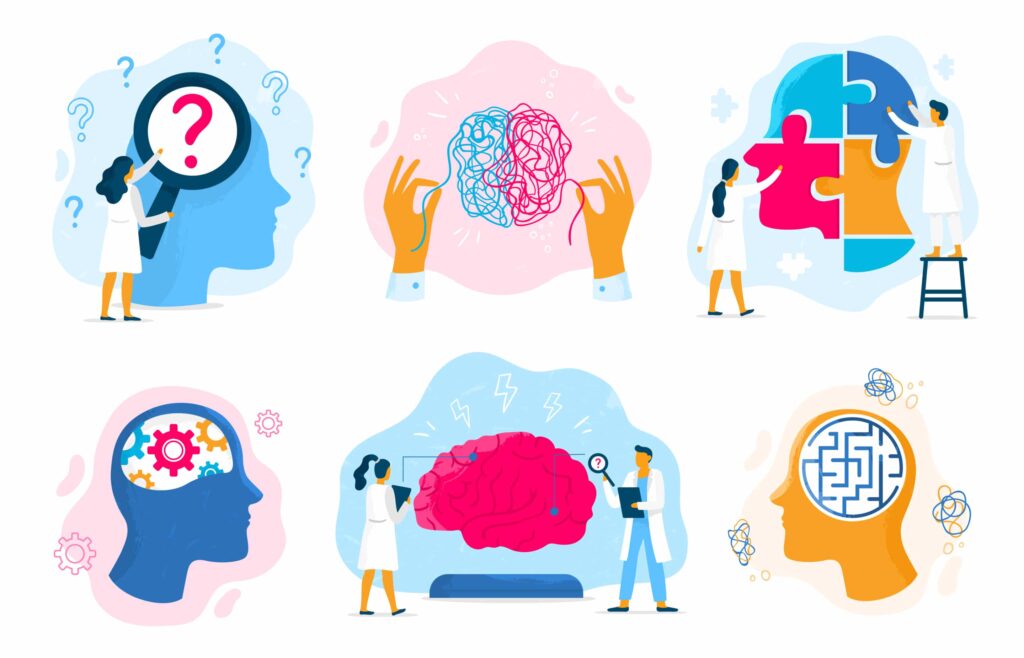People with obsessive-compulsive disorder (OCD) experience persistent, intrusive thoughts and urges (obsessions) that repeatedly arise and cause significant distress. To alleviate these thoughts, individuals feel compelled to engage in repetitive actions or mental routines (compulsions) in response to their obsessions.
The Basics of OCD
Other disorders related to OCD primarily involve recurring, body-focused repetitive behaviors, such as hair-pulling or skin-picking, and involve ongoing efforts to stop these actions. Examples of these related conditions include hoarding disorder, body dysmorphic disorder, trichotillomania (hair-pulling disorder), excoriation (skin-picking disorder), and olfactory reference disorder.
Obsessive-Compulsive Disorder (OCD) OCD is characterized by persistent and unwanted thoughts, images, or urges (obsessions) that lead people to perform repetitive actions or rituals (compulsions) in an attempt to relieve the distress caused by these thoughts. Common compulsions include washing, checking, and counting. These behaviors often consume significant time, cause emotional distress, and interfere with daily life, such as social interactions or responsibilities.
While many people experience unpleasant thoughts or repetitive actions, those without OCD do not find them as overwhelming, time-consuming, or distressing. In contrast, individuals with OCD experience rigid, intrusive thoughts, and feel a strong need to perform rituals, often fearing negative consequences if they do not. Although most people with OCD recognize that their thoughts are unrealistic, they struggle to break free from these patterns.
OCD affects about 1-2% of the U.S. population, with a slightly higher prevalence among adult women than men. The disorder often begins during childhood, adolescence, or early adulthood.
OCD Obsessions
Obsessions are intrusive, repetitive thoughts, urges, or mental images that are distressing and difficult to control. These recurring thoughts often trigger negative emotions like anxiety, fear, or disgust. Individuals with OCD are generally aware that these thoughts are irrational or excessive but find it challenging to overcome them through reasoning. To reduce the emotional discomfort caused by these obsessions, people often engage in compulsive behaviors. For instance, someone who fears contamination from touching doorknobs might compulsively wash their hands excessively. Some may also attempt to distract themselves or suppress their obsessive thoughts through other activities.
Common themes of obsessions include:
- Fear of contamination from people or the environment.
- Unsettling sexual images or thoughts.
- Religious concerns, often involving unrealistic or outrageous ideas.
- Fear of harm, either to oneself or loved ones.
- Intense anxiety about incompleteness.
- Obsession with order, precision, or symmetry.
- Fear of losing or discarding something important.
- Random, meaningless thoughts, images, sounds, or music.
Compulsions from OCD
Compulsions are repetitive actions or mental routines that individuals feel driven to perform to alleviate the distress caused by their obsessions. These compulsions offer temporary relief, reinforcing the need to perform the actions in the future. Compulsions may be directly connected to the obsession (such as washing hands excessively to prevent contamination) or unrelated actions that the person believes prevent harm. In severe cases, these rituals can consume much of the day, interfering with normal activities.
Examples of compulsions include:
- Excessive or ritualistic hand washing or showering.
- Repeatedly cleaning household items.
- Arranging objects in a precise order.
- Constantly checking locks, appliances, or switches.
- Frequently seeking reassurance.
- Engaging in number-based rituals, such as counting or repeating actions a certain number of times.
Many people with OCD may avoid situations or places that trigger their obsessions or compulsions, which can impair their functioning and negatively affect their mental and physical health.
Obsessive Compulsive Disorder Treatment

The first-line therapy for OCD is a specific type of CBT known as exposure and response prevention (ERP). ERP has the strongest evidence supporting its effectiveness. During therapy, patients are gradually exposed to situations or thoughts that provoke their obsessions, without allowing them to perform their rituals. For instance, someone who checks the stove multiple times before leaving the house would gradually reduce the number of checks over time.
Through repeated exposure without the ritual, patients learn that their fearful thoughts are just thoughts and that the feared outcomes don’t occur, even without performing the compulsions. This helps them to cope with their anxiety without relying on compulsive behaviors. Therapy is typically a collaborative process, with patients working together with their therapist to create an exposure plan that gradually increases in difficulty.
Selective serotonin-reuptake inhibitors (SSRIs) are another common treatment for OCD. Research shows that SSRIs are often effective in reducing OCD symptoms. SSRIs used for OCD include fluoxetine (Prozac), sertraline (Zoloft), escitalopram (Lexapro), fluvoxamine (Luvox), and paroxetine (Paxil). OCD often requires higher doses of SSRIs than those used to treat depression, and it can take 6-12 weeks to see improvement. If one SSRI is not effective, another one may work better, or a different medication may be added.
SSRIs are generally well tolerated, and if side effects occur, they often improve with time or can be managed with other strategies. These medications are not addictive and should be taken consistently for the best results.
Supporting a Loved One with OCD
Family and friends play a crucial role in supporting someone with OCD. Encouraging their participation in ERP exercises and avoiding accommodation of compulsive behaviors can enhance treatment success. For instance, it is helpful for loved ones not to assist with rituals or avoidance behaviors. Therapists can guide family and friends on how to best support their loved one while promoting healthier coping mechanisms.
If you or a loved one are struggling with OCD, give the team at Alter Behavioral Health a call. We’re available to provide comprehensive, compassionate care for those experiencing autism spectrum disorder. We offer autism care in all levels of care. This includes crisis stabilization & intervention, residential mental health treatment, partial hospitalization programs, and intensive outpatient treatment. Give our admissions team a call today!
About Alter
Alter is a behavioral healthcare provider that specializes in evidence-based clinical treatment approaches. We provide a wide range of programs for adults and families experiencing mental health conditions including schizophrenia, depression, borderline personality disorder, anxiety, substance abuse, and more. This is done through client-centered care for a full-continuum of treatment. We serve the entire U.S. population from our revolutionary locations throughout sunny Southern California. Whether an individual needs 24/7 care or wants an outpatient program – we are there to guide every step of the journey. For more information, give us a call at (877) 613-9776 or visit our website at alterbehavioralhealth.com.



